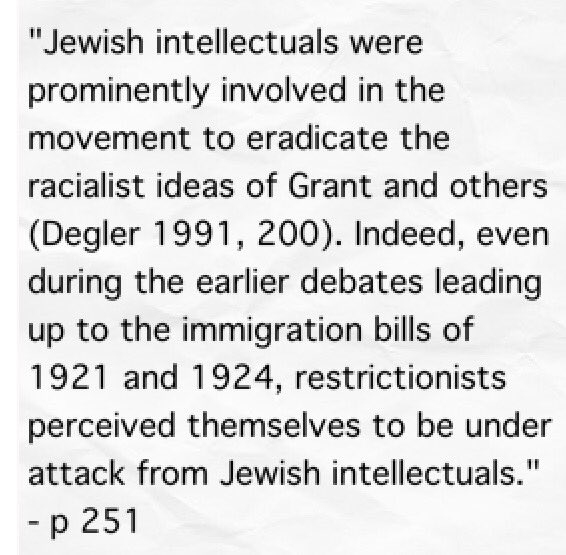
1/ “The forces of immigration restriction were temporarily successful with the immigration laws of 1921 and 1924, which passed despite the intense opposition of Jewish groups.” - p 263
2/ “Divine (1957, 8) notes, ‘Arrayed against [the restrictionist forces] in 1921 were only the spokespersons for the southeastern European immigrants, mainly Jewish leaders, whose protests were drowned out by the general cry for restriction.’” - p 263
3/ “Similarly, during the 1924 congressional hearings on immigration, ‘The most prominent group of witnesses against the bill were representatives of southeastern European immigrants, particularly Jewish leaders’ (Divine 1957, 16).” - p 263
4/ “Jewish opposition to this legislation was motivated as much by their perception that the laws were motivated by anti-Semitism and that they discriminated in favor of Northwestern Europeans as by concern that they would curtail Jewish immigration (Neuringer 1971, 164) - p 263
5/ Opposition to...immigration in favor of Northwestern Europeans remained characteristic of Jewish attitudes in the following years, but the opposition of Jewish organizations to any restrictions on immigration based on race or ethnicity can be traced back to the 19th century.”
6/ “Thus in 1882 the Jewish press was unanimous in its condemnation of the Chinese Exclusion Act (Neuringer 1971, 23) even though this Act had no direct bearing on Jewish immigration.” - p 263
7/ “In the early twentieth century the AJCommittee at times actively fought against any bill that restricted immigration to white persons or non-Asians, and only refrained from active opposition if it judged that AJCommittee support would threaten the immigration of Jews...”
8/ “In 1920 the Central Conference of American Rabbis passed a resolution urging that ‘the Nation...keep the gates of our beloved Republic open...to the oppressed and distressed of all mankind in conformity with its historic role as a haven of refuge for all men and women...’”
9/ “‘The American Hebrew,’ a publication founded in 1867 to represent the German-Jewish establishment of the period, reiterated its long-standing policy that it ‘has always stood for the admission of immigrants of all classes, irrespective of nationality.’” - p 263
10/ “And in his testimony at the 1924 hearings before the House Committee on Immigration and Naturalization, the AJCommittee’s Louis Marshall stated that the bill echoed the sentiments of the Ku Klux Klan...inspired by the racialist theories of Houston Stewart Chamberlain.”
• • •
Missing some Tweet in this thread? You can try to
force a refresh









